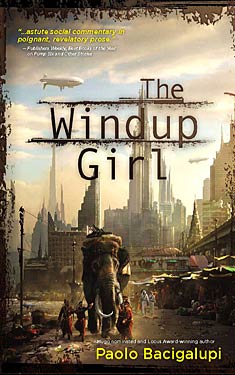Paolo Bacigalupi
Completed 5/27/2013, reviewed 5/27/2013
3 stars
This book was quite a huge disappointment for me. Based on the little blurb on the back cover,
it seemed to have some interesting plot points.
It barely had one. The Windup
Girl aspires to being a dystopian classic.
I found it rather boring.
 The story takes place in apparently near future
The story takes place in apparently near future
Bacigalupi transforms Bangkok
into a dystopian city, akin to New
York in Blade Runner.
Dirty, humid, hot, corrupted, crawling with the poor, and run by
government organizations trying to keep the calorie companies from taking over
completely.
One of the biggest disappointments to me was the concept of
calorie currency. If it wasn’t on the
back cover, I never would have known calories were supposed to be
currency. If it really is, it’s hard to
tell with all the normal money floating around for bribes. So don’t be confused. The currency is the baht, the Thai unit of
currency. That is the only thing that
flows. If calories are currency,
Bacigalupi didn’t take it to where it would be obvious.
The only character I liked was the wind-up girl, Emiko. Her characterization was quite
elaborate. Unfortunately, she was hardly
in the book. The evil calorie lord,
Anderson, began interestingly, but quickly seemed to become a supporting
character. Anderson and Emiko had a
relationship. However, the development
of the relationship was not described.
It was inferred by the reflections of the main characters. I would have liked to have gotten a more
detailed look at how their relationship progressed. It would have created a better basis for the
plot twist later in the book.
I think the reason I didn’t care for the main characters was
that we spent too much time in their pasts.
We only learn about them through their reflections on their lives, not
in their present. There really isn’t
much action. This is a book about setting
moods. The action only really happens at
the end. The rest of it is about the
main characters spending lots of time running, hiding, or pursuing, while
thinking about their past.
As I mentioned, most of the action happens at the end. That’s where the story finally gets
gripping. But it is too much too
late. Even the revolution that happens
in the middle of the book is only another device for character reflection.
I gave this book 3 stars.
It is like much of the previous noir winners, but at least I felt like
the prose was readable.
No comments:
Post a Comment